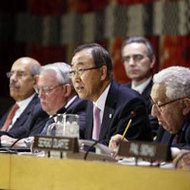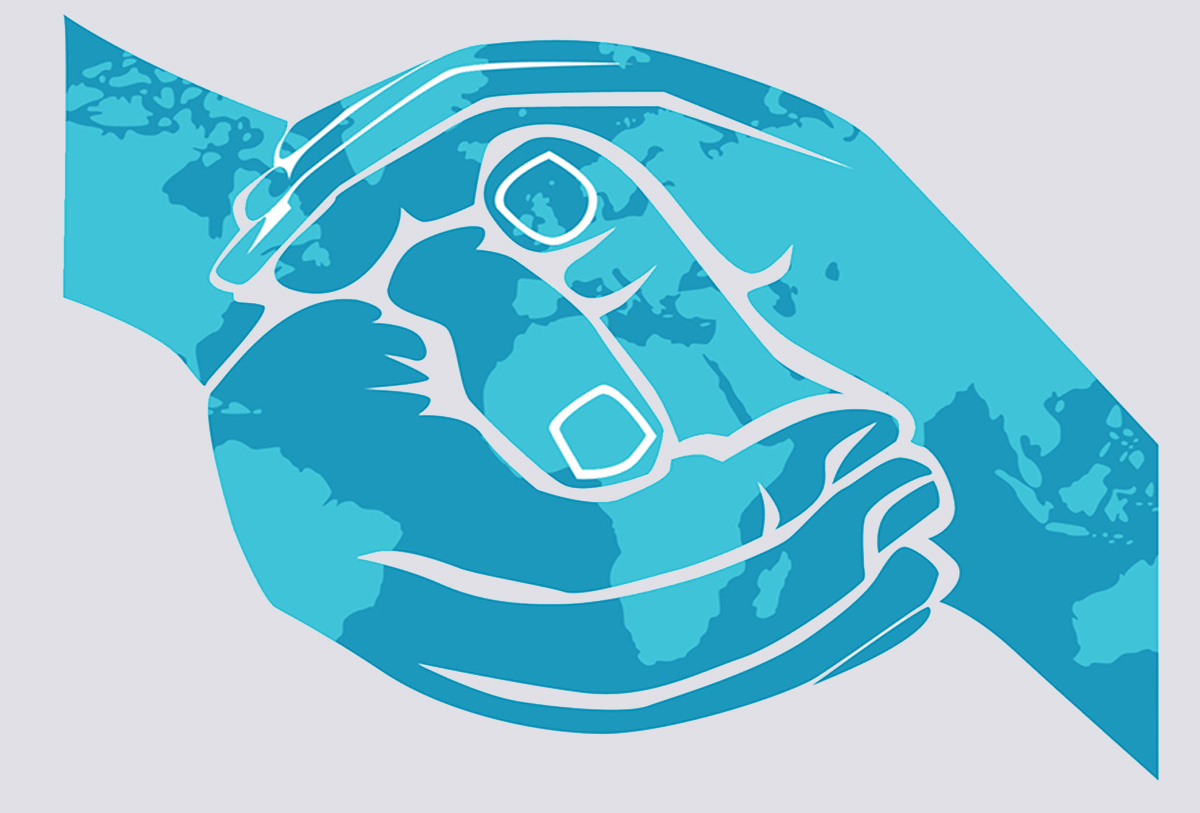Dear friends,
The hopes of the world are focused on the US presidential election. It is probably the most important election in recent history. The collective challenges facing the world are daunting: the very health of the global commons – the oceans, rainforests and climate, living systems upon which civilization depends – are at risk, a global economic crisis challenges the daily lives of billions, and nuclear weapons hang over our heads like a sword on a string. How these challenges are addressed in the next few years may actually decide the fate of humanity and our Earth for generations.
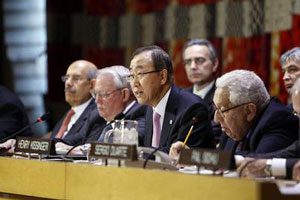 |
|
The morning plenary of the October 24 conference at the United Nations
|
Regardless of who wins on November 4, a consistent, coherent voice to advance nuclear disarmament and global cooperative security based on the rule of law will remain necessary. The Global Security Institute (GSI), along with many other civil society initiatives and governments, is advancing these goals on multiple fronts, in the US through the Bipartisan Security Group and internationally through the Middle Powers Initiative and the network of Parliamentarians for Nuclear Non-Proliferation and Disarmament.
GSI supports advancing the incremental steps that include obtaining entry-into-force of the Comprehensive nuclear Test-Ban Treaty (CTBT); deep verifiable irreversible cuts in the arsenals; a treaty ending further production of nuclear weapons materials; and lowering the operational status and thus political currency of nuclear weapons. These steps are supported by nearly every country in the world and will help create an enabling environment for a nuclear weapons convention. We view pursuing both a convention and these steps as mutually supportive endeavors. Our pursuit is grounded in the moral understanding that nuclear weapons are unethical and, as GSI founder Senator Alan Cranston noted, unworthy of civilization.
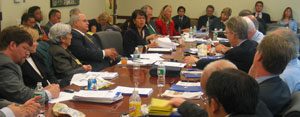 |
|
Ambassador Asmady of Indonesia addresses the strategy session on a nuclear weapons convention. |
Secretary-General of the United Nations Ban Ki-moon has placed a marker of global leadership before us. In his speech to the conference, “Seizing the Moment: A One-Day Consultation on Breakthrough Measures on Weapons of Mass Destruction and Disarmament,” he laid out a 5 point proposal to advance nuclear disarmament, a historic and inspiring agenda. His first point calls for a global summit to negotiate a nuclear weapons convention. GSI feels honored to be a co-sponsor of the conference, and to have organized, as part of the afternoon segment, a strategy session to advance a nuclear weapons convention. The EastWest Institute should be congratulated for providing a platform for the Secretary-General to put forth his proposals. All of us must work together to turn these proposals into action.
On a parallel front, GSI continues to advance the incremental measures promoted by the Middle Powers Initiative, such as the entry-into-force of the CTBT. On this issue, we were honored to have helped organize a ministerial meeting with Friends of the Comprehensive nuclear Test-Ban Treaty and the CTBT Organization at the United Nations on September 24. Secretary-General Ban, former US Secretary of Defense Dr. William Perry, and UN Messenger of Peace Michael Douglas gave sterling addresses to promote entry-into-force of that important treaty.
In addition to articulating particular solutions, GSI emphsizes the need for a clear, moral message on the abolition of nuclear weapons. On September 18-19, GSI President Jonathan Granoff, along with MPI Chairman Hon. Douglas Roche, O.C., scholar and author Jonathan Schell, UN High Representative Sergio Duarte and GSI Board member Rev. Tyler Wigg Stevenson, participated in an extraordinary conference at Yale Divinity School, where theologians, activists and students gathered to discuss the challenge of nuclear weapons through their learned lenses. (Video of the panels is also available here.) Last week, Mr. Granoff was hosted once again on “Wellness Radio,” the weekly radio show from Deepak Chopra, where he discussed the convergence of moral and practical imperatives to advance global legal norms relating to disarmament in international affairs.
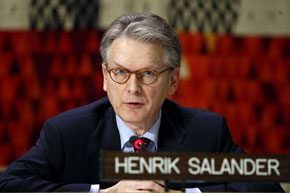 |
|
MPI Chairman-Elect H.E. Mr. Henrik Salander, speaking at the EWI Conference on October 24 as Secretary-General of the WMD CommissionPhoto credit: UN Photo # 202848 |
Senator Douglas Roche, O.C., celebrated his 80th birthday at a nuclear disarmament seminar October 14, where he delivered a speech, “Its the Future, Stupid!” which I regard as a compass point of leadership, incorporating an inspirational message for the coming years. I urge your review of this powerful speech.
The world will inevitably change after November 4, and when the new administration takes office on January 20, 2009. GSI will continue to advance policies and vision needed to obtain a nuclear weapon-free world. Your personal commitment to advance these goals in whatever manner you can and your support of our efforts is crucial.
Best wishes,
 |
Jonathan Granoff
President
» “‘Contagious’ doctrine of deterrence has made non-proliferation more difficult, raised new risks, Secretary-General says in address to EastWest Institute,” full transcript of remarks made by Secretary-General Ban Ki-moon, October 24, 2008.
» Full text of “Galvanizing the Focus: A Nuclear Weapons Convention,” presentation by Mr. Jonathan Granoff, President of the Global Security Institute at the strategy session on an NWC
» Click here for a report of the NWC strategy session, October 24, 2008, held at 866 UN Plaza
» Click here for the report of the conference, “Seizing the Moment” from the EastWest Institute. EWI’s “Seizing the Moment,” conference, was co-sponsored by the James Martin Center for Nonproliferation Studies, the Global Security Institute, the British-American Security Information Council and the NGO Committee on Disarmament, Peace and Security. It was held at the United Nations on Octobe 24, 2008.
» Report of the CTBTO of the Ministerial Meeting September 24
» More information about the Yale Divinity School conference, “Are We Safe Yet?”, held September 18-19 as part of Yale University’s Sarah Smith conference series.
Jonathan Granoff is the President of the Global Security Institute, a representative to United Nations of the World Summits of Nobel Peace Laureates, a former Adjunct Professor of International Law at Widener University School of Law, and Senior Advisor to the Committee on National Security American Bar Association International Law Section.

